by Naomi L. | December 4, 2013 | Blog, Creative Writing |
Flash fiction is quickly becoming one of my favorite formats of creative writing. Interestingly enough, I didn’t even know what it was three years ago. I discovered it through my 2011 creative writing course as a format called the “short short story”, and it didn’t take me long to fall in love with it.
Short short stories, also known as flash fiction, are stories with less than the typical short story word count, though exactly how much that is depends on the source. From my understanding, a short story consists of at least 1,000 words; anything shorter is considered flash fiction.
As I soon learned, this style of writing was perfectly suited for me, and I’ve been writing more often in this format over the past few years. I haven’t been familiar with flash fiction for too long, so I can’t really go into an extensive lesson about it. What I can do, however, is list the main reasons why I’ve enjoyed my experience with it so far, and why I think others could enjoy it too. So just for fun, here’s a list of five reasons I love flash fiction.
1) Quick to write, quick to read. Who has the time to read long stories these days? OK, a lot of people do, but for those who don’t have that much time on their hands, flash fiction is a great alternative, for readers and writers alike. While a novel may take days to finish and short stories need time to be fully appreciated, several flash fiction stories can be written and/or read in a single sitting, making them the literary equivalent of “snacks” to the longer stories’ “supper”. Don’t get me wrong: I don’t believe a writer should take any less care with a short short story than with a novel, but when the demand for editing grows exponentially with increasing word count, flash fiction is probably the best place for the less experienced to start.
2) Best of two worlds. When I was introduced to short short stories, I learned that they’re considered a middle ground between poetry and short stories. Since I love both formats, being able to mix them into one has proven an excellent option for me. With the brevity of poetic verse and the structure of short stories, flash fiction encompasses the best of both worlds, and for that, I love it all the more.
3) A challenge for the mind. How do you tell an entire story in so few words? Trying to condense a plot – complete with characters, setting and conflict – is an exercise that I’ve found quite challenging, and it’s really helped me develop my skills as a writer. By challenging writers to cut a story down to the bone, I think flash fiction is great for helping beginners understand the essence of fiction, an essential first step for any aspiring storyteller.
4) Cutting out the “purple”. Another challenge of writing short fiction is having to place significance on every single word of a story. When working with a limit of very few words, there’s no room for unnecessary flowery details. It’s imperative to get straight to the point with only the most basic details, and that makes flash fiction excellent practice for avoiding “purple prose“. Tell a story, period.
5) It’s fun! I think this pretty much says it all. For all the reasons above, I have tons of fun writing flash fiction, and that’s why it’s one of my favorite styles of writing!
What about you? Why do (or don’t) you like flash fiction? Any other points you would add to this list?
by Naomi L. | November 6, 2013 | Blog, Creative Writing |
All native English speakers are familiar with this problem: words and phrases that appear similar in spelling, pronunciation or meaning, but that actually have distinct definitions. This, of course, can cause some confusion when writing. After all, it’s not always easy keeping track of the right words for the context we want, and even the most proficient writers make mistakes. But nobody’s perfect, right?
 To help you avoid some common (and a few uncommon) grammar pitfalls, here are 25 examples of words and phrases you may be getting mixed up in your writing. Almost all of these items were taken from The Hodges Harbrace Handbook, an excellent resource for beginning and advanced writers alike. Be sure to check it out if you can! Write wisely!
To help you avoid some common (and a few uncommon) grammar pitfalls, here are 25 examples of words and phrases you may be getting mixed up in your writing. Almost all of these items were taken from The Hodges Harbrace Handbook, an excellent resource for beginning and advanced writers alike. Be sure to check it out if you can! Write wisely!
1) accept/except
It’s easy to confuse these words because they sound so similar, but they have very different definitions. “Accept” is a verb that means “to receive with consent”; “except” is a preposition that means “other than”. “Except” is also a verb meaning “to exclude”.
I accept all apologies, except those that aren’t heartfelt.
2) affect/effect
These words are so easy to mix up that I always stop and double-check if I’m using the right one before I move on. “Affect” is a verb meaning “to make a difference to”; “effect” is a noun meaning “result of a cause”. As a verb, “effect” means “to cause”.
The effect that book had on my friend’s life did not affect my opinion of it.
3) among/between
Here’s an example of two words that seem similar in meaning, but that aren’t usually interchangeable because their uses depend on context. Generally speaking, “between” is exclusively for referring to two entities, while three or more should be referred to using “among”.
Between the two of us, I don’t see any love among the three band members.
4) anymore/any more
Who among us hasn’t once mistakenly inserted a space where it wasn’t necessary (or omitted one where it was)? I’m sure we’ve all had our doubts about the difference between “anymore” and “any more”. As one word, “anymore” means “any longer”, while as two, “any more” is used with a negative to mean “no more”.
Do not give me any more problems, or I won’t have the patience to deal with you anymore.
5) can/may
Did anyone else’s parents use to answer the question “Can I?” with “You can, but you may not”? No? Just mine? OK, then. Basically, by answering sarcastically, my parents were teaching us the proper way to ask if we were allowed to do something, as “can” refers to ability while “may” refers to permission.
You can drive 80 miles an hour, but you may not go over the speed limit.
6) coarse/course
Here’s a pair of homophones that are especially easy to get confused because they only differ by one letter. “Coarse” is an adjective that means “rough”, but “course” is a noun that means “route” or “plan of study” (or a verb that means “move without obstruction”).
We’ll need a new course of action if we want to make this coarse piece smooth.
7) complement/compliment
This is another pair of words that sound alike and differ by one letter. Don’t let these verbs confuse you, though. “Complement” means “to complete”, and “compliment” means “to express praise”. Be sure to check which letter you’re using!
I had to compliment her on how well her piece was able to complement mine.
8) elicit/illicit
This mistake is a little less common, but still possible to make due to similar spelling. “Elicit” is a verb meaning “to evoke a response”, and “illicit” is an adjective meaning “illegal”.
She was quick to elicit objections from her peers by talking about her boyfriend’s illicit actions.
9) eminent/imminent
I’ve actually never made this mistake myself because I’m not too familiar with the word “eminent”, but I still think it’s worth mentioning. Though both are adjectives, “eminent” means “distinguished”, and “imminent” means “about to happen”.
For such an eminent artist, worldwide success was imminent.
10) everyday/every day
Oh, those darn spaces, always confusing us! Here’s another mistake we have to watch for, because a single space does change the meaning behind the words! “Everyday” as one word means “commonplace” or “routine”, but “every day” as two words means “each day”.
Every day, I have to help my sister deal with her everyday problems.
11) explicit/implicit
This one might not be very common, but it’s still an important mistake to note, because even though these two adjectives seem similar, they have opposite meanings. “Explicit” means “stated clearly”, while “implicit” means “expressed indirectly”. Make sure you’re not saying the opposite of what you mean!
By using explicit details, the director makes the message of the movie implicit.
12) farther/further
These adverbs may seem interchangeable, but which one you should use actually depends on context. Both are comparatives of “far”, but “farther” is used to refer to geographic distance, while “further” is used to mean “more”.
We’ll need further assistance if we’re to travel farther tomorrow than we did today.
13) fewer/less
I added this example to the list because it’s common for writers to go straight for “less” when indicating lower amounts. Like the cases of “among”/”between” and “farther”/”further”, however, context is important. Though both words mean the same thing, “fewer” is for nouns that can be counted, while “less” is for nouns that can’t.
Since I started outlining my novel, I have fewer blank notebook pages and much less free space on my desk.
14) good/well
Colloquial speech has made it very common for people to mix up the proper uses of “good” and “well”. I can attest to this from personal experience; knowing the difference between “good” and “well” doesn’t keep me from answering “How are you?” with “Good”. But even though they mean the same thing, there’s a difference: “good” is an adjective and “well” is an adverb. Make sure you aren’t confusing them!
A good writer knows how to tell stories well.
15) its/it’s
What’s a list of common grammar mistakes without a few examples of “contraction confusion”? We’ve all been guilty of this error before, but it’s understandable when one apostrophe makes all the difference. “Its” is the possessive form of “it”, and “it’s” is the contraction of “it is”. Careful with that apostrophe!
It’s easy for students to struggle with English and its many grammar rules.
16) lay/lie
This is one mistake I always have to take extra care not to make, because the past tense of one is the present tense of the other! The main difference between these verbs is that one takes an object while the other doesn’t. “Lay” means “to put (something) down”; “lie” means “to rest”.
I have to lay my things on the desk before I can lie down.
17) raise/rise
This is a tough mistake to make, but I’m fairly certain I’ve seen it happen before. Like the previous example, the difference between these verbs is that one is transitive and the other is intransitive. “Raise” means “to lift (something) up”, while “rise” means “to ascend”.
The teacher made me raise my hand and ask permission before I could rise from my chair.
18) sometime/some time
Yes, it’s another case involving a space (sorry for the lame rhyme). Whether you write it as one word or two will alter the meaning of the sentence. “Sometime” as one word means “at an unspecified time”, and “some time” as two words indicates a span of time.
Sometime next month, we’ll be able to spend some time together.
19) than/then
These are two words that I constantly mix up by accident, to the point where I always read the sentence at least three times to make sure I used the right one before moving on. “Than” is a conjunction and preposition used in comparisons; “then” is an adverb indicating a time sequence. Always be sure to double-check!
Back then, he used to say he’d rather listen to underground rock than mainstream pop music.
20) their/there/they’re
Here it is: the famous trio! You didn’t think I’d leave this one out, did you? Self-proclaimed “Internet grammar police” love picking on people for this mistake, and although I sympathize with those who commit the error once in a while, I can’t forgive those who insist on interchanging these words without any respect for the English language. “Their” is the possessive form of “they”; “there” is an adverb referring to location; and “they’re” is the contraction of “they are”. Be careful with your word choice!
They’re going there to retrieve their test scores.
21) to/too/two
Here’s another famous word trio. When one letter makes all the difference, it’s very easy to mix these words up. “To” is a preposition and infinitive marker; “too” is an adverb meaning “also” or “excessively”; and “two” is a number.
Two mistakes in your essay are still too many if you hope to ace this test.
22) weather/whether
This one may seem unlikely, but I swear I’ve seen writers mix up these words before. “Weather” is a noun referring to the state of the atmosphere (and sometimes a verb meaning “to wear away”); “whether” is a conjunction indicating a choice between alternatives. Make sure you’re using the right word!
Whether or not you believe in climate change, you can’t deny that the weather has been strange lately.
23) who/whom
We all know that person who insists on correcting us when we use “who” incorrectly (my family does for sure, because it’s me). Which word you use depends on voice: “who” is used as a subject, while “whom” is used as an object. When in doubt, try rewording the phrase with “he/she” (subject) or “him/her” (object).
To whom it may concern, I’m the one who let the birds out of the cage.
24) whose/who’s
Speaking of “who”, here’s another pair of homophones that are easy to confuse. Even I sometimes have to go back and fix the mistake. “Whose” is the possessive form of “who”, and “who’s” is the contraction of “who is”.
Whose fault is it if we can’t figure out who’s responsible for this mess?
25) your/you’re
And now for the final pair of easily confused words: the famous “your” and “you’re”. Friends fans, remember that moment when Ross is fighting with Rachel over the letter she wrote him, and points out her grammar error for good measure? Yes, he was drawing attention to a mistake that many people are guilty of making at least once in their writing. But we all know which word is which: “your” is the possessive form of “you”, and “you’re” is the contraction of “you are”. The trick is making sure we’re using the right one!
You’re not going anywhere until your homework is done!
These are just some of the many examples of easily confused words in the English language. Yes, an innocent mistake now and then is forgivable; our grammar is so complex that even native speakers struggle with it from time to time. Still, as writers, we should take care to avoid these mistakes as much as possible. If nothing else, we should be setting a good example for all other English speakers!
What about you? Have you ever confused any of these words and phrases before? What other examples would you add to this list?
by Naomi L. | October 9, 2013 | Blog, Creative Writing, Featured |
The new Romeo & Juliet movie is coming to UK and US theaters this Friday (which I admit makes me totally jealous, since there’s no set release date for where I live yet). In the spirit of celebrating one of William Shakespeare’s most famous plays, today’s topic is centered around this classic tale of love, fate and tragedy.
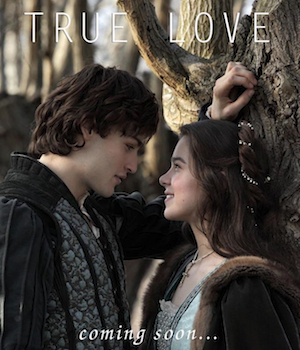
Douglas Booth and Hailee Steinfeld as Romeo and Juliet
Now I’m going to make a confession: I absolutely love this story. I love any story about forbidden love (as long as it’s well-told), and being the epitome of such a tale, Romeo & Juliet may be one of my favorites. In fact, I love it so much that I’ve read scenes several times over (yes, I read Shakespeare for fun, believe it or not), have actively sought out a fair share of adaptations, and have even used it as inspiration for my own romantic fiction.
But don’t mistake me for a silly fangirl. For the longest time, I believed the common interpretation that Romeo and Juliet were no more than two immature teenagers who recklessly rushed into a superficial relationship at the ultimate expense of their families and the rest of Verona. It wasn’t until I started researching in-depth analyses of the story (again, for inspiration) that I came to understand what I was missing in Shakespeare’s timeless classic, and what most modern readers/viewers might be missing too.
So to set your impressions straight before you head out to see this movie, here is a list of five points in Romeo & Juliet that you probably never noticed before. Get ready to see another side of this story!
(Warning: the following list contains possible spoilers for Romeo & Juliet. If you’re one of the few people on the Internet who are not familiar with this tragic story, proceed with caution. Or you can just read a full summary of the plot here.)
1) Rosaline is an important character
Before Romeo meets Juliet and falls desperately in love with her, he actually has his sights set on a different girl: Rosaline. In fact, his very first appearance in the play has him moping to his cousin Benvolio about the unrequited love he claims to feel for this unseen lady, and he even agrees to crash the Capulet ball with his friends just for the chance to see her.
But other versions of the story tend not to place very much importance on Rosaline. Most adaptations don’t even give her a face, and some exclude her character altogether, instead providing a different explanation for the Romeo character’s depression before he meets his Juliet (e.g. West Side Story: Tony longs for excitement in his life, which he finally discovers upon meeting Maria). This common alternative likely stems from the assumption that Rosaline’s only purpose in the original story is to lure Romeo to the ball so he can cross paths with Juliet, a plot point that can be easily worked around (continuing from the previous example, Tony first encounters Maria at a local dance that he only agreed to attend as a favor to his best friend).
Yet Rosaline actually plays a much greater role than a mere plot device. While pining for her, Romeo has a preconceived notion of what it means to be in love, and acts according to the lessons he’s learned from the hackneyed romantic poetry he likes to recite when thinking of her. At the first sight of Juliet, however, he abandons every thought of his former clichéd infatuation in favor of a much deeper passion that sparks some incredibly beautiful and original love poetry from his own heart (which, when you think about it, may have been Shakespeare’s way of saying “Take that!” to the poets before his time). To put it simply, the switch from Rosaline to Juliet is essential to highlight the main characters’ true feelings for each other by showing the audience the difference between Romeo thinking he’s in love and Romeo actually being in love.
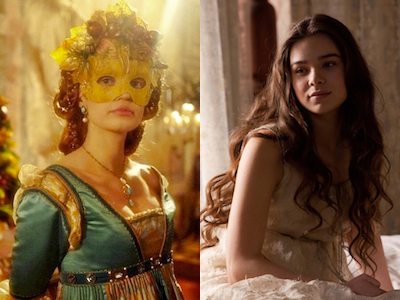
Seriously, did Rosaline ever stand a chance against Juliet?
What you’re probably thinking: He takes one look at Juliet and forgets about Rosaline just like that? Damn, Romeo is so superficial!
What you should be thinking: Wow, Juliet inspires such beautiful passion in Romeo! He must really love her!
2) Mercutio’s Queen Mab speech is a warning
One of the many famous monologues in Shakespeare’s works is the Queen Mab speech delivered by the bold Mercutio in Act 1, Scene 4 of Romeo & Juliet. This is the scene in which he teases Romeo for pining after Rosaline and tries to break his illusions of love by delivering a lecture about the dreams of men and how they can ultimately lead to ruin. Sound familiar?
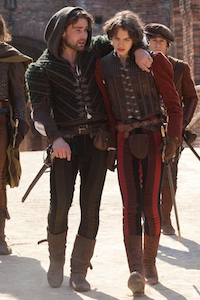
“True, I talk of dreams,
Which are the children of an idle brain” (1.4.97-98)
Mercutio starts by talking about Queen Mab, the mythical fairy queen who rides through the night bringing pleasant dreams tailored to every sleeping individual. But as he goes on, the lighthearted speech quickly takes a morbid turn into a downward spiral through darker visions of depravity (from lovers dreaming of romance to soldiers dreaming of killing), until finally culminating in a bitter yet accurate portrayal of society. Instead of taking from the speech a lesson about realism and the twisted nature of humanity, however, the idealistic Romeo simply disregards his friend’s words as another of his many mischievous taunts, silencing him with a single exasperated comment, “Thou talk’st of nothing.”
Like Romeo, modern audiences might be inclined to dismiss the Queen Mab speech as unnecessary rambling that contributes little to the rest of the story. Indeed, the monologue’s main purpose is to illustrate Mercutio’s wit and roguish nature, but it can also be interpreted as a critique against the romantic ideals that drive the play’s entire plot. In a way, Mercutio’s speech is foreshadowing the tragedies that will occur over the course of the story, and while it isn’t necessarily important, it certainly adds an interesting subtext to the themes of Romeo & Juliet.
What you’re probably thinking: Man, Mercutio really likes to hear himself talk!
What you should be thinking: Mercutio knew a thing or two about realism. Romeo probably should have listened…
3) Paris and Lady Montague even the score
Remember that part near the end of the story when Romeo kills the Count Paris in the Capulet tomb, and that other part when Montague says his wife died of grief after their son was banished from Verona? No? Then you must be familiar with any version of Romeo & Juliet other than the original play itself.
The fact is, most adaptations of this play tend to exclude the deaths of Paris and Lady Montague because they don’t contribute very much to the plot. The latter even goes virtually unnoticed, her offstage death being summed up in only two lines. So why would the playwright even bother killing these characters off in the first place?
Because it’s only fair. Before Romeo and Juliet famously take their own lives at the end, two other important characters suffer dramatic deaths in the middle of the story: Mercutio and Tybalt. But wait, wasn’t Mercutio on the Montagues’ side? Yes, but he was not a member of their family, as Tybalt was of the Capulets’. Mercutio was actually from the third noble family in the play: the Prince’s. This means that after all four of these characters die, the House of Capulet would technically have suffered the greatest loss.
Unless one more family member were to be lost from each of the other two houses. Enter Count Paris and Lady Montague. Paris, though aligned with the Capulets, is another kinsman to the Prince, and ends up being killed in a fight with Romeo during his visit to Juliet’s tomb while she’s faking her death. A little later, after the bodies are discovered in the tomb, the Prince calls forth the heads of the feuding households, at which point Montague accounts for his wife’s absence by explaining that the news of her son’s banishment ended up killing her.
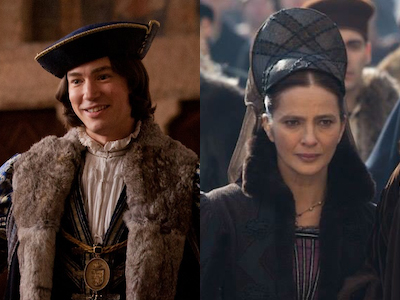
Surprise: one of them might not survive the movie this time. Guess who.
Final death toll:
- Capulets – 2 (Juliet and Tybalt)
- Montagues – 2 (Romeo and Lady Montague)
- Prince – 2 (Mercutio and Paris)
Conclusion: everyone loses, but at least in perfect balance.
What you’re probably thinking: Six people die by the end of the story? Shakespeare was twisted! No wonder most newer versions cut out these deaths!
What you should be thinking: Wow, every house loses two loved ones? How sad!
4) The poison and the dagger are symbolic

Romeo: “Thy drugs are quick. Thus with a kiss I die.” (5.3.120)
Juliet: “O happy dagger,/ This is thy sheath. There rust and let me die.” (5.3.169-170)
If there’s one thing for which Shakespeare was notorious, it was his innuendos. Plenty of his works contain their fair share of double entendres and the like, and Romeo & Juliet is no exception. However, instead of covering every example in the play (which would take a while, especially for scenes involving Mercutio), let’s just skip ahead to the one hidden in the famous double suicide ending.
You know how Romeo kills himself by drinking poison when he thinks Juliet is dead, and then Juliet stabs herself with Romeo’s dagger after she finds his body? Well, guess what: those two items are not random, but were carefully chosen to secretly represent the lovers’ intimate relationship. Romeo’s weapon of choice comes in a cup, which is a symbol of femininity. In contrast, Juliet uses a blade, a symbol of masculinity, to take her own life. In this way, their deaths are meant to reflect the intimacy they shared in life, thus completing the play’s theme of love ending in tragedy.
Or it’s all just another product of Shakespeare’s deviant mind, depending on how you choose to read into it.
What you’re probably thinking: Shakespeare must have been a misogynist, to have Juliet suffer a much more painful death than Romeo.
What you should be thinking: Even their deaths symbolize their intimate love. Shakespeare was clever with metaphors.
5) Romeo & Juliet is a coming-of-age story
Now I know what you might be thinking: how can Romeo & Juliet be a coming-of-age story if the entire plot only happens over four days? Perhaps it’s not a coming-of-age story in the traditional sense, as the teenage protagonists never actually reach adulthood, but their characters do mature throughout the course of the play, from the moment they meet to their untimely end.
At the beginning of the story, Romeo and Juliet are little more than naïve adolescents, both fairly inexperienced in life and in love. As soon as they first cross paths, however, they quickly propel each other toward the maturity of adulthood. Upon meeting Juliet, Romeo sheds his superficial conceptions of romance to become one of the most truly passionate lovers in all of English literature, and it is this passion that drives his actions for the rest of the play. Juliet, in turn, draws strength from her love for Romeo to develop into a confident and levelheaded young woman, making shrewd observations (“You kiss by th’ book”) and logical decisions that balance out her lover’s spontaneity. The intense love that outweighs the hatred around them makes their marriage all the more pure, and their loyalty to one another drives them to choose an eternity together in death over a miserable life alone. In short, though modern interpretations mistake these young lovers for foolishly infatuated teenagers, in-depth analyses reveal the true qualities of their complex characters, bringing to light the real depth of Shakespeare’s classic story of “death-marked love”.
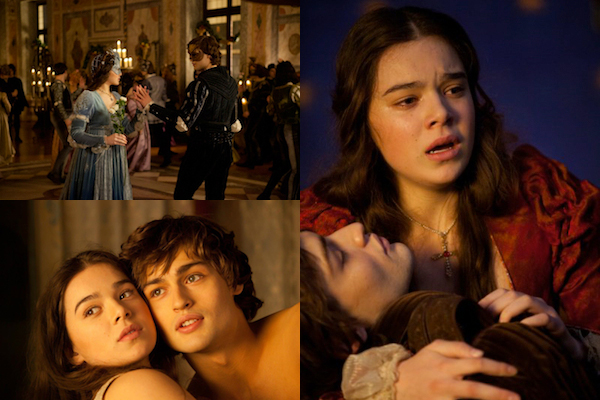
“For never was a story of more woe
Than this of Juliet and her Romeo.” (5.3.309-310)
What you’re probably thinking: They rushed into marriage after less than a day and then killed themselves because they couldn’t live without each other? Romeo and Juliet were so immature!
What you should be thinking: They were so young and they experienced such a grand romance. Romeo and Juliet were truly in love!
All caught up on these secret details?
Great! To leave you on a high note, here is the official trailer for the 2013 release of Romeo & Juliet (the original UK trailer can be found here). Enjoy!
[youtube=http://www.youtube.com/watch?v=Gp9yaZcrtnU]
Reasons I have high hopes for this movie:
- A screenplay adapted by Downton Abbey creator Julian Fellowes
- A stellar cast featuring talents such as Hailee Steinfeld, Douglas Booth, Ed Westwick, Damian Lewis and Paul Giamatti
- Good chemistry between co-stars Hailee Steinfeld and Douglas Booth
- Shot entirely on location in Verona and Mantua, Italy
I hope you’ve enjoyed reading about the secrets hidden in Romeo & Juliet! I understand that many will disagree with some of these points, but honestly, I think that’s part of the beauty of this tale: that it can be interpreted in so many different ways. To some, it’s a tale of love thwarted by fate; to others, it’s a warning about the dangers of being too impulsive. In any case, I’m sure we can all agree that this classic story has greatly endured the test of time, and will probably continue to intrigue admirers of Shakespeare and inspire the romantic at heart for generations to come.
On a final friendly note: kids, trust me when I say you do not want a romance like Romeo and Juliet’s! Yes, this is a beautiful story and a great one to read and learn from, but the story you want to live is that of Grandma and Grandpa, who had a life and grew old together. It’s important to know the difference!
Oh, and if anyone from the UK or US happens to watch this film, please let me know if it’s good. I’m very much looking forward to it. Thanks for reading!
(Disclaimer: All images and video in this blog post are courtesy of Swarovski Entertainment and Amber Entertainment. For news about the film, follow them on Facebook and Twitter. I own nothing; I’m just a fan hoping to spread the love. Thank you!)
by Naomi L. | June 26, 2013 | Blog, Creative Writing |
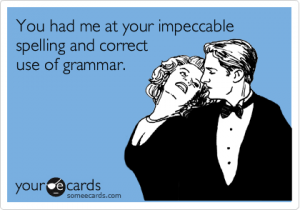 I don’t usually like to get picky about grammar, save for when I’m editing my own writing (or teasing my closest friends). Every now and then, however, I catch a few minor “mistakes” in the writing and speech of others that jump out at me. I use quotation marks because they aren’t necessarily wrong; I just tend to find them a bit odd, and occasionally a little annoying. Maybe there are others who would agree, and maybe sometimes it’s just me being my regular nerdy self.
I don’t usually like to get picky about grammar, save for when I’m editing my own writing (or teasing my closest friends). Every now and then, however, I catch a few minor “mistakes” in the writing and speech of others that jump out at me. I use quotation marks because they aren’t necessarily wrong; I just tend to find them a bit odd, and occasionally a little annoying. Maybe there are others who would agree, and maybe sometimes it’s just me being my regular nerdy self.
Just for fun, today’s topic brings you three random “pet peeves” of mine that are widely accepted as understandable language. You can decide for yourself where you stand on these…
1) When “could” really means “couldn’t”
I admit that it bothers me a little to see people using the phrase “I could care less” when they clearly mean to say “I couldn’t care less”. The logic behind the phrasing is simple: if you “couldn’t care less”, you’ve reached the limit of how little you can care about something, whereas if you “could care less”, there’s still a little part of you that does care and has yet to be eliminated.
I’ve heard a couple of theories as to how the “could” variation emerged in colloquial speech. One states that it was originally meant to be used in a sarcastic manner and not taken literally. Another explanation, according to American linguist Atcheson L. Hench, is that slurred speech has garbled the “couldn’t” of the correct phrase into the “could” that most people hear (American Speech, 159; 1973).
Which explanation is the truth? I have no idea. All I know is that I always use the original phrasing in my own speech, and if anyone doesn’t believe me when I say it’s the “correct” form, I couldn’t care less.
2) The American pronunciation of “niche”
I’ve lost count of all the playful arguments I’ve had with my best friend over this word. Our debates usually play out the same: I tell him the correct pronunciation is “neesh”; he answers back that people say “nitch”. I explain that the word comes from French, so its original pronunciation should be maintained; he argues that we’re American and we should adapt to the way most Americans speak. I ask him if by that logic, we should also start saying “ba-LET” and “gor-MET”; he claims that’s not the same thing because everyone says “ba-LAY” and “gor-MAY” without a problem. Then we toss the word “niche” back and forth, each of us insisting that our pronunciation is correct, until we both get tired and agree to disagree before changing the subject. After the entire discussion is over, we’re still friends.
Albeit friends who each still think they’re right. (Neesh.)
3) The alternative spelling of “doughnut”
To be fair, this one is more of a personal preference than an actual pet peeve. I understand that both “doughnut” and “donut” are equally acceptable spellings; I just prefer the former because it seems to me – for lack of a better description – “more correct”. It is the original spelling, after all; the invention of doughnuts can be traced back as far as the 19th century, but the earliest known printed use of the word “donut” is only from 1900 (Peck’s Bad Boy and His Pa by George W. Peck). Not to mention, “doughnut” also feels more complete: just by looking at the word, you can already tell what the main ingredient is…
Still, both spellings are equally pervasive in American English, though “doughnut” seems to be the more common form outside of the United States. Oxford Dictionaries list “donut” as the alternative spelling of “doughnut”, making the longer word the traditional option for more formal writing, yet the shortened form is popular for references like company names (e.g. Dunkin’ Donuts). Even my best friend (yes, the same young man who advocates so strongly for “nitch”) insists that “donut” is the best spelling because it’s modern, and thus more appealing to the readers of today. As he says whenever I insist that “doughnut” is the better choice, “Take it up with The Donut Man!”
These are just a few random examples of minor deviations from my grammatical standards. Like I said, they aren’t really wrong; it’s all a matter of preference. And call me a geek if you like, but I simply chose the alternatives that I deemed grammatically correct.
So what about you? Can you relate to any of the examples listed above? Do you have pet peeves of your own that don’t really detract from communication more than they just annoy you?
by Naomi L. | May 29, 2013 | Blog, Creative Writing |
I fell in love with creative writing when I was in the fourth grade, after spending many childhood years reading books and discovering the fun of narrative composition assignments in school. At the age of ten, I decided that writing was something I wanted to do for the rest of my life, and publishing a book was one of those goals I absolutely had to accomplish at least once before I died. Eager to get a headstart on my career as an author, I wasted no time in writing my first novel. As it turned out, however, being a preteen writer came with a major disadvantage: a severe lack of experience.

The vintage typewriter of my life: this is the classic iMac on which my very first novel was written.
The final product of my labor was a relatively short tale about a child’s adventure through a dream world, creating imaginary friends along the way to aid her on her quest to develop what she had been missing for years: an active imagination. Though I believed the idea to be a good one, I realized a few years after finishing the story that the execution was subpar due to various mistakes that I hadn’t recognized when I was ten. Of course, I don’t want to bore you with the details of every single one, so instead, here’s a list of five of the most important aspects of fiction writing that I wish I had known when I was working on my first book.
1) Good books don’t get written in a day.
Unless you’re an extremely focused hermit locked in a room with nothing but a desk and a typewriter (or you’re the Flash), you’re not turning out a bestselling novel in less than 24 hours. Now, I didn’t literally expect to write a whole book in one day, but given that the basic outline of a plot was already clear in my mind when I started, I also didn’t expect it to take longer than a week to finish. Instead, I probably spent the equivalent of at least a month’s worth of writing before I finally completed my novel. By creating such unrealistic expectations, I was setting myself up for the disappointment that inevitably hit me after the first week of writing came and went. And disappointment is not an emotion that ten-year-olds are usually prepared to handle well…
It’s worth mentioning, however, that I probably still could have finished my story in less time than it actually took me. So why didn’t I? Because there was one piece of advice I didn’t take into account before I started…
2) Planning is important.
I made the rookie mistake of thinking that a single idea was all I needed before I actually started writing a novel. I thought that as long as I could keep that one idea clear in my head, inspiration would take over and I’d have a full manuscript ready before I knew it. Unfortunately, as I quickly discovered, novels don’t quite work that way. There were several instances during the writing process when I had to stop and even retrace my steps because I wasn’t entirely sure how to move the action forward, or how to fill a gap between two scenes that I already knew were going to happen. I’m not saying I should have spent a year only planning without actually writing anything, but had I taken just a little more time to map out the full course of my story before I dove headfirst into the narrative, I could have saved myself a lot of confusion and tedious rewrites in the long run.
3) Compelling characters are those who are flawed.
During the course of my story, my protagonist created three imaginary friends, each of whom was some sort of fantasy creature with magical abilities of incredible power. Ironically, the only imperfection in each of these characters was the fact that they were perfect. They were all beautiful, intelligent, strong, courageous, and downright wonderful in every way conceivable. In retrospect, they were probably the personifications of the qualities I subconsciously wished or wanted to believe I had myself, with none of the drawbacks.
But there was a major problem with this: my characters were not relatable. Perfection was fine for my own daydreams, but nobody wants to read about impossibly powerful heroes who can save the day without so much as breaking a sweat (outside of comic books, that is). Readers want heroes who make mistakes, who fight for their goals with everything they’ve got and emerge triumphant after struggles that only made them stronger in the end. In other words, readers want to potentially see themselves in their heroes. And my characters didn’t fulfill that purpose. By designing them to be impossibly perfect, I had inadvertently made them every writer’s worst nightmare: boring.
4) Bad things must happen to good people.
Yes, I was one of those idealistic children raised on fairy tales, who believed that good always triumphed over evil, and the heroes should always defeat the villains in every battle, with no exceptions. This was reflected in the climax of my novel: when I finally introduced actual antagonists near the end of the story (another mistake, mind you), a series of fights ensued in which my main characters would always beat the bad guys every time they tried to attack. In the end, the villains were completely defeated, while the heroes were left without even a scratch. As you can imagine, that was a pretty boring scene.
This was probably the biggest flaw of my story: I had failed to create suspense. With every single attack of every single fight ending in the heroes’ favor, the scene that should have been the most exciting part of my novel became too predictable and bland. If, however, I had thrown a few twists into the mix, such as having one of my protagonists suffer a terrible injury that put her at the villains’ mercy, I could have set the scene up for a much more engaging and satisfying conclusion. In short, if anyone was going to care about whether my good guys would win the war, there had to be at least a chance that the bad guys might win a few battles first.
5) Your first book is going to stink… no matter what.
OK, maybe this isn’t true for all writers, but it’s likely true for most (if you’re one of the exceptions, I salute you). Sometimes I think that even if I had known everything else about planning and character development and conflict, my first novel still would have turned out mediocre at best. I was, after all, only ten years old; how well could I really have written a story reflecting important values of life if I had barely even started living mine? But even if I had started my first book in my twenties, I’m sure it still wouldn’t have amounted to a great classic of literature, because to know what to do in order to turn out a brilliant piece of fiction, I first would have had to know what not to do, and there’s only one truly effective way to learn that lesson…
I have absolutely no regrets about my first attempt at writing a novel. Although it was rather lame, I still love it for everything it’s taught me about fiction writing, and the fact that I was able to start gaining this experience at such a young age makes me all the more optimistic about my future as a writer. Today, I’m proud to say that I am once again working on a novel, this time with naturally flawed characters and a storyline filled with due drama and suspense, all planned out well in advance. From here on, there’s only room for improvement.
So what about you? If you’re a writer, have you been through a similar experience? What did you learn from your first mistakes in fiction writing?
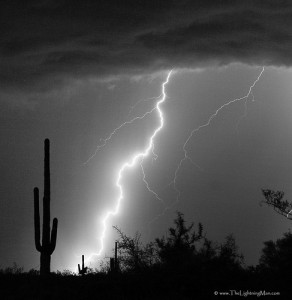


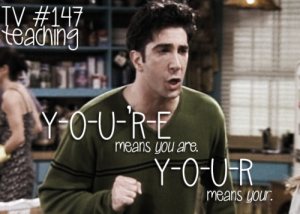









Recent Comments